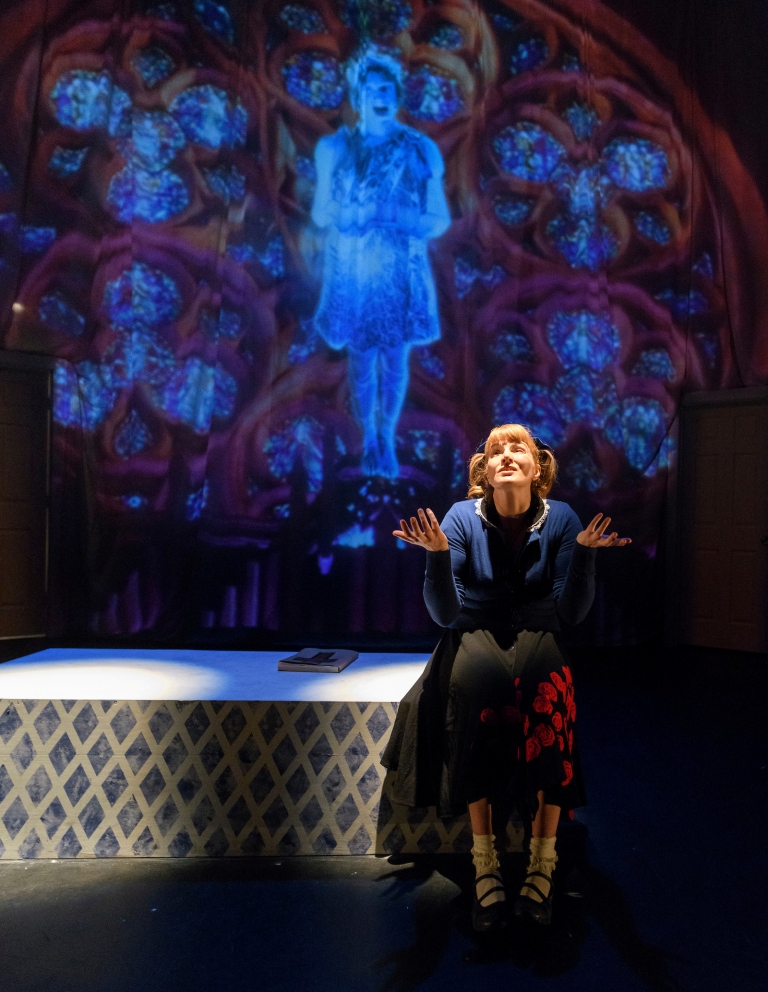New Cat Walsh play full of dead ends and detours
Posted on March 16, 2018 By Colin MacLean Entertainment, Front Slider, Theatre
 Edmonton Playwright Cat Walsh writes in a Ray Bradbury-ish style of sci-fi: horror, creatures and the end of the world.
Edmonton Playwright Cat Walsh writes in a Ray Bradbury-ish style of sci-fi: horror, creatures and the end of the world.
She’s no horrormeister looking for a cheap scare, but fills her unsettling works in an ever growing suspense-filled environment acted upon by threatening exterior forces. She is more Hitchcock then George A. Romero. You may remember her unsettling Eleven-Oh-Four a few years back at the Fringe or The Laws of Thermodynamics that examined the chilling Steven King-like tale of a man trying to leave a town but can’t find a way out (both Sterling nominated).
Her latest play, Do This In Memory of Me (Christ’s words at the Last Supper), is the current production from Edmonton’s adventurous Northern Light Theatre (co-produced with L’UniTheatre). The play may not summon forth the devils that haunt some of her earlier works, but it certainly addresses another spiritual realm – the worship of God and the nature of faith. Walsh has described the play as “sweet but with an edge.”
Do This In Memory of Me takes us to the Montreal of 1963. Twelve year old Genevieve (Nicole St. Martin) is the only girl in a large Quebec Catholic family. The Quiet Revolution is in the wind, but apparently not in Genevieve’s parish. A devout adolescent, she desperately wants to be an altar-server but, alas, her sex precludes her that honour – no girls on French-Canadian altars.
“Not allowed,” tut-tuts Father Paul (Brian Dooley). “God wouldn’t approve,” he dodders, going into a litany of young ladies who became sainted because they kept their chastity at the expense of being beheaded or burned at the stake. Women are good, apparently, as saints and for making sandwiches for church observances.
“Do you have any brothers?” Father Paul keeps asking.
 So Genevieve turns to her constant companion, God, to change the church’s position. The kid carries on intimate conversations with her Maker. Martin (Steve Jodoin) is the number one altar boy at the church – and one day he just disappears. Genevieve comes to believe that indeed her prayers have been answered and is horrified by the cost. Her guilt here might have provided some fertile ground for dramatic development. Doesn’t happen.
So Genevieve turns to her constant companion, God, to change the church’s position. The kid carries on intimate conversations with her Maker. Martin (Steve Jodoin) is the number one altar boy at the church – and one day he just disappears. Genevieve comes to believe that indeed her prayers have been answered and is horrified by the cost. Her guilt here might have provided some fertile ground for dramatic development. Doesn’t happen.
It is hard not to immediately notice Darrin Hagen’s music and sound design. Enveloping and macabre, it promises much to come. But this is not one of those productions.
Director Trevor Schmidt’s set is a bench and a very large drape that covers the entire back end of the theatre with a couple of doors on either side. Not much of a set is the feeling but never underestimate Schmidt when it comes to set design. The drape turns into a huge screen on which the director, and multimedia designer Matt Schuurman, project an amazing series of animated and often comic images that take you from outer space to the bottom of a local pond. There is also a chilling visit from some death-masked nuns who snake across the sky, clattering as they pass. They are followed by a Biblical plague of ravens. Interesting. Creepy. But except for a guest shot in a couple of later vignettes, that’s it for the sepulchral sisters. That seems to be another interesting idea that went nowhere.
Meanwhile, Genevieve turns out to be a high-spirited lass. After dispatching poor Martin, God departs, leaving her to fend for herself. A spirit guide appears (in yet another large and arresting projection) in the person of St. Pancras of Rome. The good saint, who seems to have also been something of a vaudevillian, was a Roman who converted to Christianity and beheaded for his faith at the age of 14, circa 304 A.D. He keeps cracking jokes and his head bounces around like a basketball. Not much help here.
Genevieve also visits Martin, who has indeed been launched into the hereafter and now inhabits the bottom of a frozen lake and also lives in the cosmos with a bunch of dogs that perished in the early years of space exploration. Her father comes to church to confess, and Genevieve, who has sneaked into the other side of the confessional, hears him tell of marital problems in the family and how mother no longer loves him.
Sputnik speeds through the skies above and, supposedly, Rene Levesque is pulling medieval Quebec into the 20th Century but, other than a brief appearance by the satellite, this is not that kind of play.
So what kind of a play is it? It is pleasant, often droll entertainment put together by some real theatrical pros. St. Martin is a winning adolescent and the actor plays her with spirit and verve. Jodoin is sparky and lively (and, yes, as Genevieve observes, “annoying”) as the hockey-mad Martin. Dooley is a local treasure. His father is a solid, sad man who can’t understand why his life, the simple kind of life his family has always lived, is now falling apart. His intimate scenes with St. Martin are wonderful in their poignancy and affection. And his aged cleric, Father Paul, in this fine actor’s hands, is a character familiar to anyone who has spent much time in Quebec. He’s forever caught in 2000 years of church misogyny.
The point of the play seems to be summed up at the end in a melancholy letter from Genevieve’s mother. She tells her child that, if she’s going to be all right, she must learn that what she wants in the world will only be found in herself.
You may come away not quite sure what the play is trying to say but the journey has indeed been “sweet but with an edge.”
Do This In Memory of Me is presented at La Cite Francophone in English or French (in translation by Manon Beaudoin) on alternate nights. It runs through March 25.
Photos by Ian Jackson













